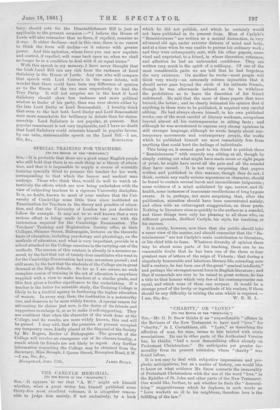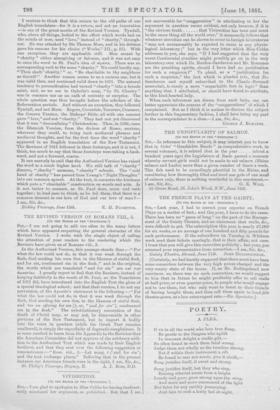"CHARITY," OR "LOVE P"
rre THE EDITOR OF THE " EPEOTATOR.1 Silt,—Mr. G. D. Snow thinks it an " unpardonable " offence in the Revisers of the New Testament to have used " love " for "charity," in I. Corinthians, xiii. "Love," as describing the affection of man for man, seems to him tainted with erotic associations. Its use in other parts of the Authorised Version has, he thinks, "had a most demoralising effect already on Protestant Christendom." He anticipates yet greater im- morality from its present extension, where "charity" was found before.
It is not easy to deal with subjective impressions and pro- phetic anticipations, but as a matter of history, one would like to know on what evidence Mr. Snow connects the immorality of Protestant Christendom with the Use of the word "love," in the Epistles of St. John and other parts of the New Testament. One would like, further, to ask whether he finds the " demoral- ising " suggestiveness which he deplores, in such words as "Love worketh no ill to his neighbour, therefore love is the fulfilling of the law." I venture to think that this return to the old paths of our English translators—for it is a return, and not an innovation —is one of the great merits of the Revised Version. Tyeclall, who, above all things, looked to the effect which words had on the rniuds of men, used. "Jove," instead of "charity," through- out. He was attacked by Sir Thomas More, and in his defence gave his reasons for his choice (" Works," III., p. 21). With one exception, they are applicable still. Men meant by "charity " either almsgiving or fairness, and it was not easy to raise the word to St. Paul's idea of siseiese. There was no corresponding verb to the noun "charity." We could hardly say, "Thou shalt ' charity,' " or, "Be charitable to thy neighbour as thyself." Another reason seems to Us a curious one, but it was valid then, and continued valid down to 1611. The natural tendency to personification had turned " charity " into a female saint, and, as we see in Ophelia'a song, "by St. Charity" was in common use as an oath of entreaty or surprise. The whole question was thus brought before the scholars of the Reformation periods. And without an exception, they followed Tyndall, and not More. Rogers, Coverdale, Taverner, Crannies, the Geneva Version, the Bishops' Bible, all with one consent gave "love," and not "charity." They had not yet discovered that it was " demoralising " Christendom. Then, in 1582, came the Rhemish Version, from the divines of Rome, anxious, wherever they could, to bring back reediasval phrases and mediaesal thoughts, and for the first time the word." charity" appeared in an English translation of the New Testament. The Revisers of 1611 followed in their footsteps, and it is not, I think, too much to say that those footsteps were taking a back- ward, and not a forward, course.
It can scarcely be said that the Authorised Version has raised the word to a much higher level. We still talk of " charity " dinners, " charity sermons, " charity" schools. The "cold hand of charity " has passed from Young's "Night Thoughts" into our common speech. At the best, it connotes the kindness 'which puts a "charitable" construction on words and acts. Is it not better to connect, as St. Paul does, noun and verb together ; to lead men to think, as he led them, that there is a common element in our love of God. and our love of man ?— I am, Sir, &c.,

































 Previous page
Previous page